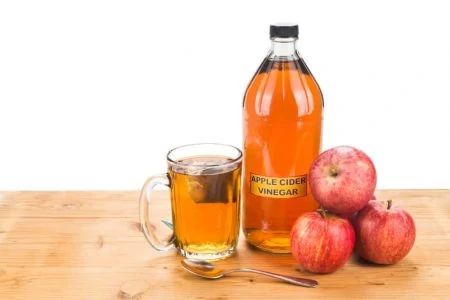Pregnancy comes with a laundry list of strange cravings and unpleasant symptoms. If you hang around wellness circles, you have probably heard that apple cider vinegar (ACV) is a magical elixir for everything from heartburn to leg cramps.
But when you are expecting, you have to be extra careful about what goes into your body. Is this fermented drink actually safe for your growing baby?
We are here to clear up the confusion. In this article, we will break down the safety of apple cider vinegar during pregnancy, explore the real benefits versus the myths, and offer tips on how to consume it safely.
Key Takeaways
- Most medical experts consider pasteurized apple cider vinegar safe for pregnant women to consume.
- Unpasteurized or “raw” vinegar carries a slight risk of harmful bacteria; opting for pasteurized versions eliminates this concern.
- Potential pregnancy benefits include relief from heartburn, leg cramps, and better blood sugar regulation.
- Always dilute vinegar with water before drinking it to prevent tooth enamel erosion or throat irritation.
What Is Apple Cider Vinegar?
Apple cider vinegar is made by fermenting the sugar from apples.
The process starts with crushed apples, which are exposed to yeast. This yeast ferments the sugars and turns them into alcohol. Next, bacteria are added to the mixture to ferment the alcohol further, turning it into acetic acid. This acid gives the vinegar its strong, sour smell and flavor (1).
Filtered vs. Unfiltered ACV
When shopping, you will generally see two main types of vinegar on the shelf. Understanding the difference is crucial for pregnancy safety.
Processing removes sediment and bacteria to create a clear, amber liquid. This is **filtered** and usually **pasteurized** vinegar.
**Unfiltered** vinegar retains a cloudy sediment known as “the mother.” This mixture of yeast and bacteria is responsible for most of the product’s probiotic qualities.
However, unfiltered ACV is often **unpasteurized**. This means it has not been heated to kill off bacteria (2). While “raw” food is popular in the wellness world, unpasteurized products can carry risks for pregnant women.
One of the most famous unpasteurized brands is Bragg, which you can find in health stores or on Amazon.
Is Apple Cider Vinegar Safe During Pregnancy?
The short answer is yes, but the type matters.
Most healthcare providers agree that **pasteurized** apple cider vinegar is safe to consume while pregnant. The pasteurization process heats the vinegar enough to kill harmful bacteria like *E. coli* or *Salmonella*.
The debate gets trickier with unpasteurized (raw) vinegar.
Because pregnant women have slightly suppressed immune systems, they are more susceptible to foodborne illnesses. While vinegar is highly acidic and naturally kills many pathogens, there is still a small risk that raw vinegar could contain harmful bacteria.
Safety Tip
While there is a lot of talk about the health benefits of ACV, it’s worth noting that ACV can interact with certain medications (including laxatives, which some moms with constipation might be taking). It can make symptoms of a pre-existing ulcer worse and can affect teeth enamel. Consuming too much can also cause serious electrolyte disbalances.
Editor's Note:
Dr. Irena Ilic, MDPotential Benefits For Pregnant Moms
While some claims about ACV are exaggerated, others have some scientific backing.
Here is how apple cider vinegar might help with common pregnancy symptoms:
- Heartburn Relief: It sounds counterintuitive to drink acid to fight acid reflux. However, some heartburn is caused by low stomach acid rather than high acid. In these cases, a diluted shot of ACV can help balance stomach pH levels and settle the burn.
- Blood Sugar Control: ACV is well-known for its ability to improve insulin sensitivity. Studies show it can help lower blood sugar responses after meals (3). This is promising for moms managing gestational diabetes, but it should never replace medication prescribed by your doctor.
- Morning Sickness: There is no hard science here, but many moms swear by it. The theory is that ACV helps balance the body’s pH, settling a queasy stomach. It is often mixed with warm water and ginger for nausea relief (4).
- Leg Cramp Relief: Sleep disruption from leg cramps is a nightmare. These cramps often stem from low potassium levels. Since ACV contains potassium, it may help ease the muscle tension.
- Cold Fighting: Pregnancy suppresses your immune system, making you prone to colds. Since you cannot take many over-the-counter drugs, natural remedies are key. ACV has antibacterial properties that may soothe a sore throat when used as a gargle (5).
Topical Uses For ACV
You do not always have to drink it to get the benefits. Apple cider vinegar is a popular topical treatment for pregnancy skin issues.
Thanks to its antibacterial nature, diluted ACV may help with the following conditions:
- Acne: Dab a diluted solution on breakouts to dry them out.
- Varicose Veins: Some moms use it to massage areas with varicose veins to improve circulation, though this is mostly anecdotal (6).
- Eczema: It may help balance skin pH and reduce itching.
Warning: Never apply full-strength vinegar to your skin. It can cause chemical burns. Always mix it with water (1 part vinegar to 2 or 3 parts water) and test a small patch of skin first.
Risks and Side Effects
Even though it is natural, ACV is potent.
Keep these potential side effects in mind before pouring a glass:
- Tooth Enamel Erosion: The high acidity can strip the enamel off your teeth. Always dilute it and consider drinking through a straw.
- Throat Irritation: Drinking it straight can burn your esophagus.
- Medication Interference: ACV can interact with diabetes medications and certain diuretics. Always check with your provider if you are on prescriptions.
- Digestive Upset: For some, ACV slows down stomach emptying. If you already feel bloated or full, this might make you feel worse.
You may wonder whether pasteurized ACV still has the potential to aid with the above-listed health issues. The truth is, research studies have not been able to confirm whether all potential benefits of ACV are lost after pasteurization.
Editor's Note:
Dr. Irena Ilic, MDFAQs
The Bottom Line
Apple cider vinegar can be a helpful tool in your pregnancy wellness kit, potentially soothing heartburn and helping with blood sugar levels.
However, it is not a miracle cure. While many moms swear by the raw version, the safest route for you and your baby is to stick to pasteurized options to avoid any risk of bacteria.
Always listen to your body. If it makes your heartburn worse or upsets your stomach, skip it. And as always, run any new dietary changes by your doctor or midwife first.






